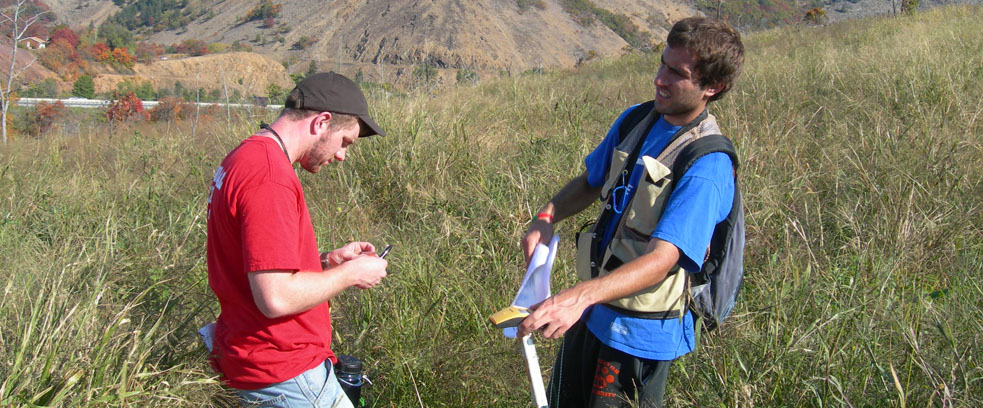
The Environmental Initiative supports a variety of research projects across all four colleges of Lehigh University. Centered around the Earth and Environmental Sciences and Civil and Environmental Engineering departments, EI-affiliated faculty, students and staff conduct research in areas as varied as communications, earth science, economics, policy, and geoenvironmental engineering.
Internships serve to provide a crucial link between scientific and societal research on the environment. Students participate in internships in which they are exposed to environmental fieldwork and data collection, then link the scientific data with societal and political effects. The EI maintains a database of collected environmental data which is used across Lehigh University and beyond to illustrate and understand environmental processes.
Water
Access and availability to sufficient quantities of clean fresh water is becoming an increasingly pressing issue nationally and internationally. As human population grows and water-intensive agriculture expands farther out from rain-fed regions, political pressure mounts to ensure that water is distributed to the populations who need it for agricultural, industrial, and domestic uses. The issue is gaining attention and concern, even without considerations of global climate changes and their impacts on regional water supplies, which only serve to compound the complexity of the issue. Lehigh faculty, staff and students are working on a variety of approaches to better understand the hydrologic cycle and its anthropogenic perturbations in both quality (through pollution) and quantity (through climate change).
Energy and Environment
Modern societies are fueled by energy, which is consumed in increasing quantities as the global economy develops. As such, the use of fossil fuels is increasing just as our awareness of its impact on global climate and the environment is maturing. There is sufficient fossil fuel available (mostly in the form of coal) to drive climate into new stable states that will likely be inhospitable to the modern societies that depend on that fossil fuel for their sustenance. In order to set society onto a sustainable path, a transition from fossil fuel burning to renewable and inexhaustible energy sources will be needed. Lehigh faculty, staff and students are exploring novel ways to enhance the efficiency of existing technologies, while developing new technologies to match an increased amount of energy to a decreased demand to achieve sustainability.
Global Change
As a result of both natural and anthropogenic alterations of the environment, climate and other conditions are changing rapidly in the 21st century. While much of the general public thinks in terms of "global warming," the ramifications of global change extend into all facets of the environment from precipitation patterns and biome distributions to ocean chemistry, ice extent and sea level. Understanding the complex Earth system at a level of detail necessary for accurate prediction of the global and regional impacts of past, present, and future human activities is a challenge that can only be met by concerted interdisciplinary efforts involving research in climate, geology, ecosystem ecology, political science, economics, and non-linear system dynamics in general. Toward that end, Lehigh is conducting research in a variety of themes that combine to shed light on the critical mechanisms that control Earth system behavior, and its response to anthropogenic forcing through emissions and land use.
Environment-Society Interactions
As modern societies become more specialized and more vulnerable to environmental variability, the issue of sustainability becomes one of adaptation to the impacts of a changing, and in most cases degrading, environment as much as it is one of mitigation of the forcing factors that drive undesirable or intolerable changes. While both mitigation and adaptation are necessary we must essentially find ways to avoid the unmanageable so that we can manage the unavoidable environmental changes that we have caused through past and present emissions and land use. This involves social dynamics, economics, politics, and communication to ensure that the broader public is aware and can be involved in thoughtful decision-making for themselves and future generations.
Environmental Literacy
A educated public is the foundation of American society, and with the increasing importance of environmental issues in modern society, it is critical for the broader public to be aware and conversant in the pressing topics involved in climate change, pollution, ecosystem ecology, and sustainability. Toward that end, Lehigh faculty, staff and students are conduction research and outreach programs that focus on dissemination of environmental knowledge to school children who will inherit the problems associated with previous generations' exploitation of natural resources, and who must be placed in the best position possible to solve those problems in ways that we have not managed to do. The challenge is further compounded by a reduction in time spent in the natural environment and activities that promote awareness of nature. Without a greater (not lesser) appreciation of the natural world and its functions, it will be exceedingly difficult for today's children to lead the way to solutions of environmental problems. We endeavor to provide them with the tools they will need to accomplish this.
Student Projects
Our students are engaged in research at all levels. Some do projects in the context of the Lehigh Earth Observatory, while others conduct a variety of independent research projects, internships, and studies abroad.
Corporate Sustainability Metrics
In collaboration with the Graduate School of Business, EI is constructing a quantified metric for measuring the sustainability of corporations. In the era of growing concern for environmental degradation, and the role of business, American consumption, and the life cycle of products, many industries are attempting to "green up" their businesses. However, there is currently no comprehensive method for assessing and measuring changes that result from corporate policies and practices regarding environmental impacts, social responsibility, and economic sustainability. Consequently, Lehigh is constructing a metric to apply to a variety of industrail sectors. This project is in its early stages, and will help shape the imlpementation of enviornmental concepts to business models in our curricula, in participating corporations, and the general public (American consumer).
